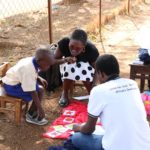Country
Year
Assignment
Partner
Funder
Theme
Scope of ECD Toolkit development for ADELAC
The objective of the ADELAC project is to contribute to improving the care of young children from birth to the end of primary school. The main objective of the consultation is to equip the project team and partners on the ECD approach promoted by the ADELAC project with a view to improving the development of young children. This analysis was carried out in Bol in the department of Mamdi.
Methodology of ECD Toolkit development for ADELAC
Armel Oguniyi, Founder at ar-mel joined as principal consultant to carry out the study. The methodology deployed for this hybrid consultation combines primary and secondary data collection and analysis primary and secondary data, media development and stakeholder training. To meet the challenges inherent in effectively involving the different categories of stakeholder in the process, we adapted dynamic Social Analysis System (SAS) techniques and strategies called “Skilful Means”. This approach enabled the consultation to be conducted in such a way as to draw conclusions in collaboration with stakeholders at all levels and stages of the process.
Outcomes of ECD Toolkit development for ADELAC
The various activities carried out have helped to assess the level of knowledge and understanding of project stakeholders and beneficiaries of the ECD approach, and to equip the ADELAC project with the materials, tools and skills needed to ensure the successful implementation of the ECD approach to ensure proper implementation of the ECD approach development approach. The consultation revealed a low level of knowledge of ECD policies in Chad among local actors implementing the Project. As a result, programmatic, operational and Monitoring, Evaluation, Accountability and Learning recommendations were made.





